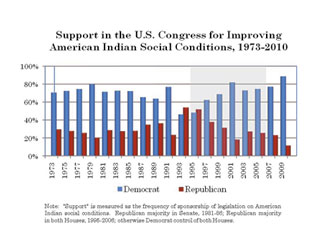Report questions congressional commitment to self-determination
By Rob Capriccioso, Today staff
WASHINGTON – Congressional Democrats and
Republicans have been strong advocates for Indian self-determination
for decades, but change is in the air, according to a new research
paper by top scholars. With the U.S. House of Representatives
shifting overwhelmingly toward the GOP after the fall elections,
Indians are left watching whether some disconcerting trends will
continue.
The report, titled “American
Indian Self-Determination: The Political Economy of a Policy that
Works,” is authored by professors Stephen Cornell, of the
University of Arizona, and Joseph P. Kalt, of the Harvard Kennedy
School.
Like many contemporary tribal leaders and citizens, they strongly
favor the federal policy of Indian self-determination, which gained
steam in the 1970s after years of failed U.S. policies toward tribes
and tribal citizens. Indian self-determination calls for the
implementation of federal programs and assistance for programs that
tribes manage, or take part in managing, such as housing services
and other social and economic programs.
The policy has long been popular among Democratic and Republican
lawmakers, but recent shifts in legislative ideologies may pose a
risk, according to the scholars’ research.
“Analysis of thousands of sponsorships of federal legislation over
1970-present, however, finds the equilibrium under challenge. In
particular, since the late 1990s, Republican congressional support
for policies of self-determination has fallen off sharply and has
not returned. The recent change in the party control of Congress
calls into question the sustainability of self-determination through
self-governance as a central principle of federal Indian policy.”
The report noted that support for Indian issues have long tended to
be bi-partisan, but when it comes to actual congressional
sponsorship of programs that are aimed at improving social
conditions for Indians, Democrats are currently far surpassing
Republicans, and have done so for much of recent decades. GOP
lawmakers did better than Democrats on this measure for a short
period in the early 1990s. (See Figure 7)
The general trend held up even when Democrats had less power.
“The policy of self-determination reflects a political equilibrium
which has held for four decades and which has withstood various
shifts in the party control of Congress and the White House,” wrote
the authors. “While Republicans have provided relatively weak
support for social spending on Indian issues when compared to
Democrats, both parties’ representatives have generally been
supportive of self-determination and local self-rule for tribes.”
Tribal self-determination took strong root through the dedicated
work of Republican President Richard Nixon and his staff, a point
the authors made in their paper. And it was Republican President
Gerald Ford who signed the Indian Self-Determination and Education
Assistance Act into law in 1975.
The authors conclude the report with an ominous portrait: “As we
look to the future, there are signs of instability in the support
for self-determination. The rising economic and political clout of
Indian nations is often seen as threats at the local level to
non-Indian governments. Although beyond the scope of this study,
this is raising inter-jurisdictional conflicts, often resulting in
litigation.
“The general trend of outcomes in the U.S. courts has been a
reigning in, rather than an expansion, of tribal sovereignty over
the last 15 to 20 years.
“In Congress, too, there are signs of change. Most particularly, the
oft-noted evolution of the Republican Party away from its
libertarian strains and toward more aggressive support for social
policymaking aimed at promoting particular conservative social norms
and structures is suggesting a trend away from the Indian
self-government movement. We might well predict that the next change
to Republican control of the U.S. Congress will signal an end to
policies of self-determination.”
If the current Congress outwardly halts self-determination policies
and programs, it would be in conflict with decades of federal
American Indian policy in the United States that has been aimed at
promoting self-determination through self-governance by federally
recognized tribes.
It would have huge ramifications for tribes, likely negative, as the
authors said the policy “has proven to be the only policy that has
worked to make significant progress in reversing otherwise
distressed social, cultural and economic conditions in Native
communities.”
Many Native Americans believe that educating the current batch of
Congress members on the history of tribal self-determination and the
strong impacts it has had on helping tribes become independent
economic entities is crucial in the months and years to come.
The full report is
online.
© 1998 - 2010 Indian Country Today. All Rights Reserved To subscribe or visit go to: http://www.indiancountry.com
